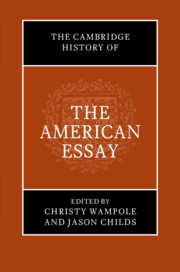Book contents
- The Cambridge History of the American Essay
- The Cambridge History of the American Essay
- Copyright page
- Contents
- Acknowledgments
- Notes on Contributors
- Introduction
- Part I The Emergence of the American Essay (1710–1865)
- Part II Voicing the American Experiment (1865–1945)
- Part III Postwar Essays and Essayism (1945–2000)
- Part IV Toward the Contemporary American Essay (2000–2020)
- 31 The American Essay Film: A Neglected Genre
- 32 Literary Theory, Criticism, and the Essay
- 33 Gender, Queerness, and the American Essay
- 34 Disability and the American Essay
- 35 The Radical Hybridity of the Lyric Essay
- 36 Writing Migration: Multiculturalism, Democracy, and the Essay Form
- 37 Latinx Culture and the Essay
- 38 Black Experience through the Essay
- 39 The Essay and the Anthropocene
- Recommendations for Further Reading
- Index
36 - Writing Migration: Multiculturalism, Democracy, and the Essay Form
from Part IV - Toward the Contemporary American Essay (2000–2020)
Published online by Cambridge University Press: 28 March 2024
- The Cambridge History of the American Essay
- The Cambridge History of the American Essay
- Copyright page
- Contents
- Acknowledgments
- Notes on Contributors
- Introduction
- Part I The Emergence of the American Essay (1710–1865)
- Part II Voicing the American Experiment (1865–1945)
- Part III Postwar Essays and Essayism (1945–2000)
- Part IV Toward the Contemporary American Essay (2000–2020)
- 31 The American Essay Film: A Neglected Genre
- 32 Literary Theory, Criticism, and the Essay
- 33 Gender, Queerness, and the American Essay
- 34 Disability and the American Essay
- 35 The Radical Hybridity of the Lyric Essay
- 36 Writing Migration: Multiculturalism, Democracy, and the Essay Form
- 37 Latinx Culture and the Essay
- 38 Black Experience through the Essay
- 39 The Essay and the Anthropocene
- Recommendations for Further Reading
- Index
Summary
The variety of immigrant experiences expressed through the essay form is the subject of this chapter, which presents a panorama of writing by US immigrants who have found unique ways to give language to an often disorienting venture. The personal essay has proven to be a powerful tool for US writers exploring what it means to be a migrant or a descendant of migrants. Social scientists tend to look at the big picture when it comes to migration, theorizing and investigating migration as the large-scale movement of people from one place to another. But every mass migration is an aggregation of individual experiences, fraught with hardship, sacrifice, and the full gamut of human emotions, from hope to despair. Personal essays about migration and its effects chart the transformations that occur when people leave one place for another. Leaving home is inevitably wrenching, and many essays about migration register a nostalgia for the place – and the life – left behind. The personal essay is a form ideally suited for capturing the motivations, achievements, and disappointments of migrants who have often come to the United States because of the promise of the nation’s democratic principles.
Keywords
- Type
- Chapter
- Information
- The Cambridge History of the American Essay , pp. 612 - 626Publisher: Cambridge University PressPrint publication year: 2023



